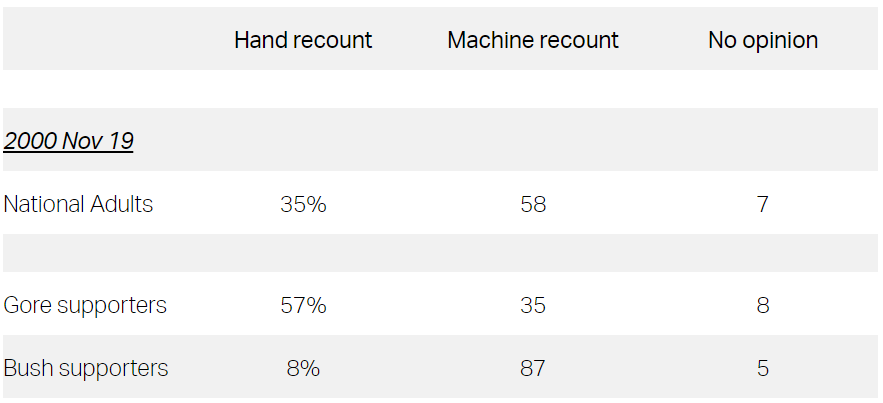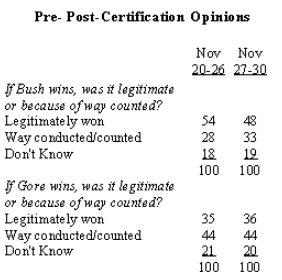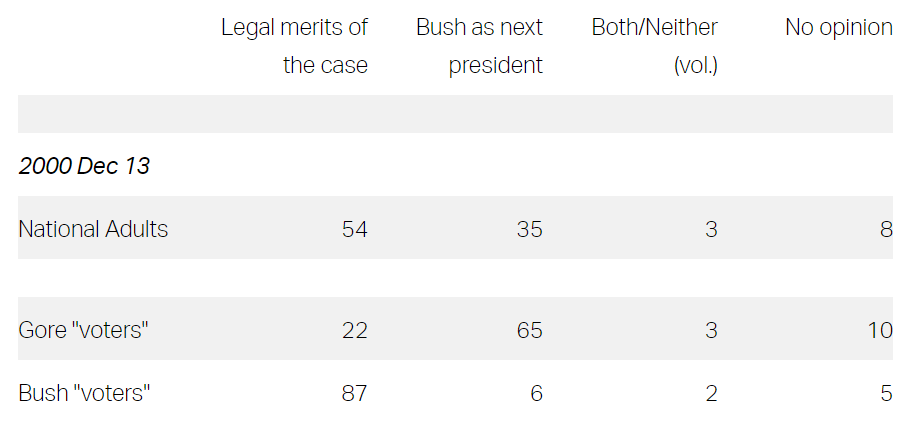Contra to Machavity's answer, it seems the Bush-Gore legitimacy question was fairly polled at the time... although few such polls have web pages 20 years later.
Gallup's poll(s) on that matter have the "hand counts" as the most divisive issue:
[Q:] As you may know, the outcome of the presidential election in Florida is still in doubt. The absentee ballots from overseas have been tallied and a machine recount was finished earlier last week. Officials in three Florida counties, however, are still recounting by hand the votes cast in those counties and courts are still deciding if the recounts by hand should be included in the final vote total. In your opinion, should these vote recounts by hand be included in the final vote total in Florida, or not?

The answers to this question certainly, if nothing else, testify to the high level of attention being paid to the situation in Florida by the average American. Note the sharp division of opinion between Gore and Bush supporters. Gore supporters overwhelmingly endorse the inclusion of the hand counts, while Bush supporters break in the opposite direction, although by not quite as significant a margin. This question was asked near the beginning of Sunday's poll, and respondents were not reminded of who was requesting recounts. Yet Gore supporters quite evidently are aware of the Gore campaign's push for hand recounts, as are Bush supporters apparently aware of the Bush campaign's fight against them.
That poll also had machine-recount-accuracy question that was the near opposite of this in term of results:
Do you think a hand recount (or) machine recount is a more accurate way to count votes?

However, despite this [partisan] disagreement over the recounting methods, when asked whether they'd accept the legitimacy of the winner, there wasn't much difference between the candidates...
Over the course of the past week, the percentage of Americans who say they would accept Bush has risen slightly, while the percentage saying the same about Gore is slightly lower, perhaps due to the visibility given the unofficial vote counts showing Bush ahead in Florida (without the inclusion of hand counts now underway in three southeastern Florida counties). A look at these perceptions by support group shows that Gore supporters are now a little more likely to say that Bush could serve legitimately (72% now as opposed to 61% last weekend), while Bush supporters have dropped from 66% to 58% in terms of saying they would support Gore as legitimate.
Still, from the broader perspective, these movements are slight, and it is apparent that either candidate would have only a small group of partisans in the country not according him legitimacy in the presidential role.
So, in one aspect there was sharp polarization in 2000 (counting methods), but in another (legitimacy of the winner), there wasn't that much.
There's also a Pew poll on this matter [conducted twice, pre- and post-certification], but the summary lacks a breakdown by party (for most questions) and the full dataset requires some kind of login. Their summary for the legitimacy question suggests more division than in the Gallup polls (which were conducted earlier that month):

Only about 48-54% of the respondents said "Bush legitimately won" as opposed to "because of the way it was counted" (28-33% said that).
In late December Gallup published another poll that had another q on which the respondents split by party, namely whether the Supreme court had decided the case by merit or by their partisan desire of whom the president should be:
Do you think the Justices of the US Supreme Court who voted to end the recount in Florida did so -- [ROTATED: mostly based on the legal merits of the case (or) mostly based on their own desire to have Bush as the next president]?

Despite this, other (longitudinal) questions (mentioned in that poll) showed that confidence in the Supreme Court didn't decrease following this event.



